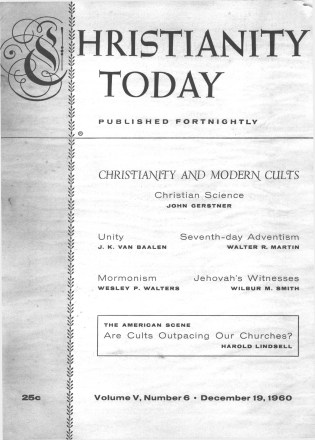If the season of Advent holds cheer that delights and dazzles a child’s heart, it holds challenge also that probes and haunts the most scintillant of learned minds. In his Cambridge Lectures on Christian Doctrine, Professor J. S. Whale makes the observation that “the Christological debates of nineteen centuries are a monument to the uniqueness of Him whom Christians know as the Incarnate Son of God.” A moment later he goes on to say that Jesus is inexplicable just because He cannot be put into a class. His uniqueness constitutes the problem to be explained. It is impossible to describe Him without becoming entangled in paradoxes. The great merit of the Creeds is that they left the paradox as such.
It is this uniqueness, in which the event of the atoning Cross is linked with the event of the incarnational Birth, that gives to us what Professor H. R. Mackintosh long ago called The Originality of the Christian Message. (The phrase is actually finer and firmer than the too subjectivistic theology with which the author supports it.) The fitness of the phrase is due partly to the telling appropriateness of the word “message.” No theology, least of all a Christology, is worthy of the New Testament that is merely treatise or discourse: it must be message.
For this reason I find particular stimulus in the theological writings of such contemporaries as Lutheran T. A. Kantonen, Presbyterian John A. Mackay, Methodist Edwin Lewis, and Anglican Stephen Neill. Their Christological concern is acute and their evangelical commitment at this point is unambiguous.
Consider Bishop Stephen Neill’s recent books, The Unfinished Task and Creative Tension. They are skillful attempts to bring into fresh focus the redemptive solitariness of Christ the Lord. Neill’s concern is not that of the theologian per se but of the missioner: he would insist (like Kantonen) that the theology of the New Testament is beyond all else kerygmatic. As a doctrinal commentator, therefore, he has always before him the missionary perspective.
In The Unfinished Task he “debunks” the myth that “each great World Christian Conference marks an advance on the one that has gone before.” As between “Edinburgh” in 1910 and “Jerusalem” in 1928 Neill holds that the direction was down rather than up. “A case could be made out,” he says, “for regarding the Jerusalem meeting in 1928 as the nadir of the modern missionary movement. This was the moment when liberal theology exercised its most fatal influence on missionary thinking, the lowest valley out of which the missionary movement has ever since been trying to make its way” (p. 151).
What Bishop Neill has in mind becomes abundantly clear to anyone who will acquaint himself with Re-Thinking Missions, produced under the editorship of Professor Hocking in 1932. An attentuated Christology evolved from an emasculated New Testament had so distracted, if not dominated, the Jerusalem Conference that the so-called “Laymen’s Inquiry” took the Hocking group around the world and crystalized its findings in the “Re-Thinking” volume. Here it was stated that “The relation between religions must take increasingly hereafter the form of a common search for truth” (p. 47). It was the crowning hour for the “comparative religion” school of thought. Christianity was still superior but it was not incomparable.
This influence, stemming from Jerusalem, has led Professor Wilhelm Andersen, a German Lutheran, to say in his recent Towards a Theology of Mission that what the dominant voices of the Conference were really asking was: “Is Christian faith, perhaps, only one particular form of the mystical experience of the divine which is the common groundwork of all religions? Should not Jesus, Buddha, Confucius, Mohammed and the rest be considered simply as different branches on the single tree of the religious experience of mankind? Are the differences between the various religions perhaps only relative differences between a more perfect or a less perfect stage of evolution?” (p. 23).
How this way of construing, and thereby betraying, the Gospel has played into the hands of the now resurgent non-Christian faiths may be illustrated from the opening paragraph of D. T. Niles’ The Preacher’s Task and the Stone of Stumbling. Niles quotes a Hindu friend of his who one day said to him, “We shall put an image of Christ into every Hindu temple and then no Hindu will see the point of becoming a Christian.” On which Niles makes the observation, “It was a remark perfectly revealing the Hindu mind. For the Hindu attitude to Jesus Christ is to accept him and make him at home in Hinduism. It is also an attitude which refuses to accept either the validity or the necessity of a Hindu becoming a Christian.”
Since the Jerusalem Conference many a theological voice has been raised in protest against the erosion of the Church’s Christology and the dilution of the Church’s message. It was in protest against the viewpoint of Re-Thinking Missions that Robert E. Speer wrote his glorious book on The Finality of Jesus Christ. It was in connection with the Madras Conference of 1938 that Hendrik Kraemer wrote his The Christian Message in a Non-Christian World, with its rejection of the “comparative religion” approach and its insistence on the uniqueness of the person of Christ and of the saving action of God in His birth, death, and resurrection on behalf of all men. It is to reaffirm, albeit with fresh and constructive relevance, the sovereignty of Christ over all of life that Stephen Neill now tells us, in Creative Tension, that even religious systems represent those human aspirations and pretentions which the Cross must first reduce to ashes that so, from the rubble of human pride, might arise the new man of faith to whom Jesus Christ is Saviour indeed.
The issue is not now, nor ever has been, one religion in comparison with another, one philosophy as against another: the issue is Christ—God incarnate, God on a Cross.










